
Are you hoping to take your blog to the next level? Well, there are several strategies that make the top marketing blogs in the industry successful.
In this post, we’re going to dig into the finer details of these top marketing blogs. With each one, we’ll inspect a particular aspect you can emulate that makes the blog thrive.
Let’s get it started!
1. Content Marketing Institute Blog – Success Focus: Editorial Calendars
One of the first parts of building a strong content marketing campaign is getting your team on the same page and coming up with a content strategy for the weeks, months, or years ahead.
The more topics you cover and the more writers you bring on board, the more important it is to create an editorial calendar.
Through my experience with the Content Marketing Institute blog, I know firsthand that staying on track and on schedule is of utmost importance to the organization.
You don’t have to look past the main page of the blog to realize that content is being published regularly, that many authors are featured, and that a variety of topics are covered, from marketing automation to optimal strategies for raising your conversion rate.
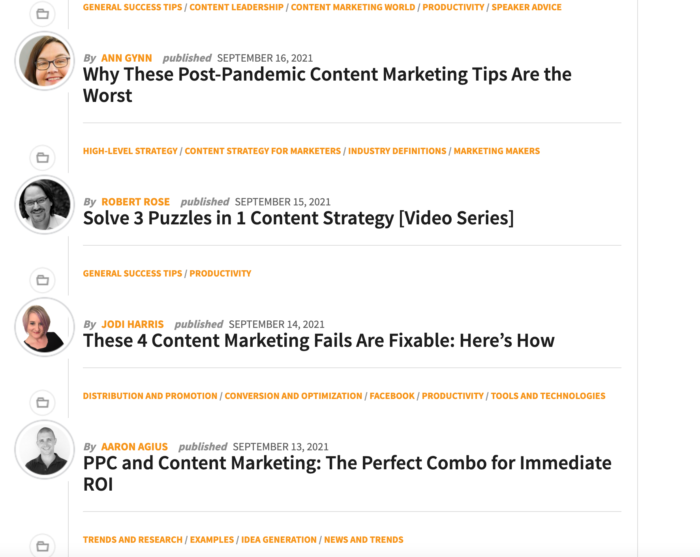
2. Copyblogger – Success Focus: Headline Use for Organization and Guidance
A blog without headlines can turn into a nightmare for the reader. The person eventually leaves the page, never to return.
Copyblogger understands the importance of targeted, detailed headlines. This holds true both for the creation of blog post titles, such as Why Lazy People Make the Best Content Marketers, and for the subheadings.
Take it from them: headlines should play a large role in content marketing strategy.
The aforementioned post is roughly 1,100 words in length. With six subheadings, readers are given additional guidance an average of every 185 words or so. This helps organize the content and move the conversation along, all while keeping the reader’s attention.

3. ConversionXL – Success Focus: Provide In-Depth Content
While length is important, length with top-notch quality is what you are after. This is where the ConversionXL blog excels. Your content strategy should be built on the idea that you need to produce quality work.
Its post on human behavior (originally written in 2016 but updated in 2020) is an excellent example of this. As you scroll through the post, it contains more than words. Every section tells a story. Every section provides actionable advice. Furthermore, the primary content partners nicely with blockquotes, headlines, screenshots, videos, and images.
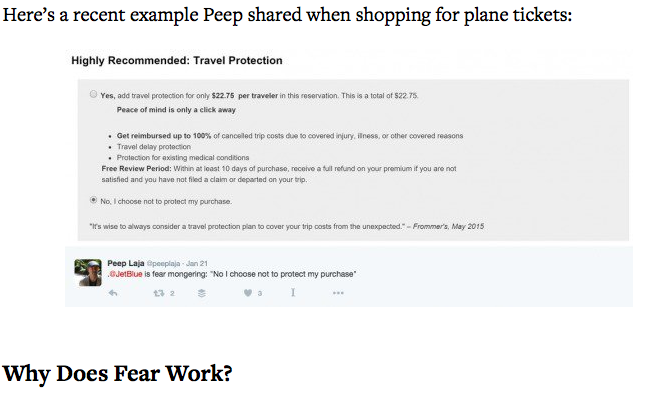
4. Convince & Convert – Success Focus: Using Images the Right Way
Images are a big part of a successful blog, but only if used in the appropriate manner.
An image should complement the content. It shouldn’t be added for the sake of taking up space.
Convince & Convert knows when to add images, when to leave them out and how to avoid “image overload.”
In a short post, such as this one, there are only three images. Move onto their longer posts, however, and you can expect the number of images to reach 10 or more.
Don’t just use images: use images the right way.
5. Moz – Success Focus: the Use of Case Studies
If you understand the importance of publishing unique, useful content, you should realize that case studies can be your best friend.
Moz takes this to a whole new level, publishing case studies that are works of art.
For example, this case study outlines the importance of title tag rewrites for SEO.
The use of case studies allows for greater depth, screenshots with examples, and a strategy for readers to copy.
6. TopRank Marketing – Success Focus: Social Marketing, Social Proof
You may understand the power of social media marketing, but that doesn’t mean you are making life easy on your readers and taking advantage of every strategy that is available to you.
TopRank makes it easy to share content socially, thanks to a list of social icons displayed prominently above each title.
Even more important is the number to the left of the icons, which displays the total number of shares. The bigger the number, the more important the content appears. This can also prompt other readers to share the content, knowing that their peers have already done so.
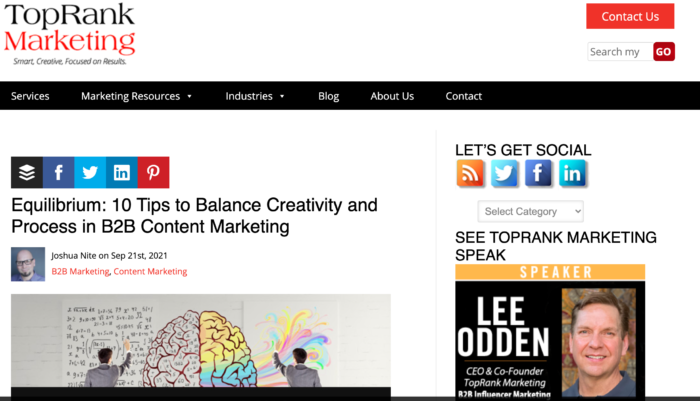
7. Econsultancy – Success Focus: Link to Useful Content
Don’t be stingy when it comes to linking to useful content. If it can help the reader, it’s worth a link.
If you want to mimic a blog that does this well, check out some of the work by Econsultancy.
They scatter links throughout, including such as in this piece about Facebook’s new smart glasses. Along the way, there are a variety of internal and external links, all of which support the content and/or provide the reader with another avenue to learn more.
8. Neil Patel – Success Focus: Comment Interaction
It’s one thing to write and publish a blog post. It’s another thing entirely to interact with your audience. Remember, the primary purpose of each post is to teach your audience something, and content marketing as a whole is about engaging with the audience that buys your product.
If you are successful in providing quality information, more and more comments will show up on your blog. You can either ignore these or you can get involved.
In my Neil Patel blog, I do my absolute best to respond to every comment, even those that do not ask a specific question. Even after a post is published, it’s important to continue to provide quality content. Answering comments allows you to add more value, while gaining the trust of your audience.
9. Social Media Examiner – Success Focus: Varied Content within a Niche
There’s only so much you can say about a particular subject, right? Well, Social Media Examiner proves this theory wrong.
By taking a broad approach to your niche, but without losing focus, there is always more to be said. Things change, new trends arise, news happens, and so forth.
Just in the past five days (preceding September 21, 2021), Social Media Examiner has covered how to grow your Instagram following, how to create YouTube in-stream ads, how to partner with YouTube micro-influencers, and more.
Broaden your scope to keep your content calendar full and to avoid boring your audience.
10. Search Engine Watch – Success Focus: Use a Multi-Author Approach
In the early days of your blog, before it gains traction, you may be the only writer. There is nothing wrong with that. Heck, this strategy can generate results even after you hit it big.
However, there are times when a multi-author platform works best, and this is what you see on Search Engine Watch (among many other top marketing blogs).
The benefits of a multi-author approach are varied, including the ability to publish more content, unique viewpoints, and the option to leverage the audience of each writer.

11. Brian Solis – Success Focus: An Authoritative Voice
Authority is something that is earned, not given. There are things you can do to speed up your growth, such as proving your authority in each post you publish, just as there’s more than one marketing strategy out there that might work well specifically for you.
Brian Solis does a nice job of proving personal authority works by taking a unique view on topics that are anything but mainstream.
For instance, you won’t find many blogs with titles such as “The Augmented Workforce: How Artificial Intelligence, Augmented Reality, And 5G Will Impact Every Dollar You Make.”
If you want to be an authority on your subject, don’t tackle the same topics and issues as the competition. This isn’t a rule that applies solely to online marketing. It can be implemented in every niche imaginable.
12. Buffer – Success Focus: Be Tran
Statistics validate your content, enhance trust between you and the reader, and give your audience confidence that you know your stuff. They also enable you to see if your content marketing efforts are helping you reach your goals.
Many posts on the Buffer blog are full of good statistics. For example, in one transparent post, they discussed their pay gap in an article called “2021 Pay Analysis: How We’ve Lowered Our Gender Pay Gap From 15% to 5.5%.”
Engaging and use of stats? Enough said.
13. Ignite Social Media – Success Focus: The Proper Use of an Introduction
Ignite Social Media has taken to providing a short introductory description of the content, giving the reader a clear idea of what’s to come.
Here is an example:
Social media marketing is unlike any other. It’s the only form of marketing where the target audience is able, and even encouraged, to talk back to the brand. When you hire a dedicated social media marketing agency, they’ll be able to guide you toward the strategies and tactics that help brands win at social media.
But how should you choose a social media agency to ensure you are working with one of the best? Below are a few secrets that separate high-performing social media agencies from the pretenders. Hear the six secrets directly from our CEO, Jim Tobin.
Providing this in the intro gives you an opportunity to hook the reader.
14. MarketingProfs – Success Focus: Be Unique
It doesn’t matter if you are a one-man show or part of a bigger digital marketing team, a unique approach sets you apart from the crowd.
The MarketingProfs blog has a different layout from other blogs. There is an intuitive category filter list in close proximity to the content.
These subtle changes can make a big difference.
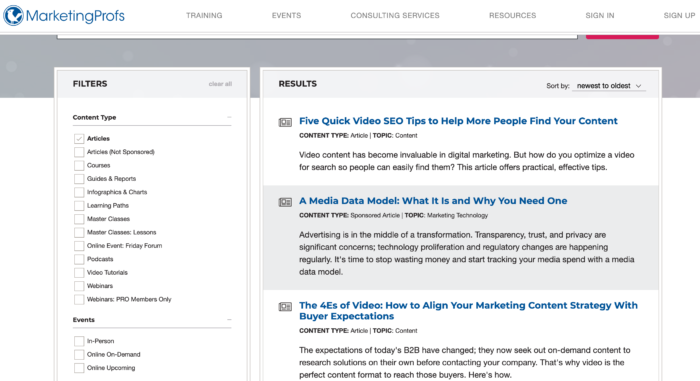
15. Social Media Today – Success Focus: User-Centric Titles/Descriptions
The user-centric approach of Social Media Today is a thing of beauty. Every post includes something in the title, description, or tags that specify who the article is for.
For example:
“TikTok Shares New Holiday Guide to Assist With Strategic Planning,” which is a title clearly aimed at social media content marketers working on their holiday campaigns; this is underscored by the “content marketing” tag that accompanies the article.
This type of personalized, user-centric strategy is not easy to master. However, once you know how to write for your audience, the end result is more engagement and a greater sense of accomplishment.
16. Search Engine Journal – Success Focus: Multiple Content Types
There are times when a reader is intrigued by a post but doesn’t want to digest every last word. This is why scannable content and multiple content types are important.
Search Engine Journal does this well. Most of its blog posts are able to be scanned in a fast and efficient manner.
Consider this post on helpful SEO animations. The post contains many headlines, a video version you can register to watch, images, infographics, and slides.
When you write content that can be easily scanned and interacted with, you can connect with a larger audience. Posts on this popular blog will furnish you with a number of excellent content marketing tips to help you hone your overall content strategy.
17. KISSmetrics – Success Focus: Use Listicles
List posts, such as this one, are easy to scan. Better yet, people love sharing list posts on social media.
There are many types of listicle posts you can write. KISSmetrics is good at these.
18. Unbounce – Success Focus: Make Your Blog Home Page Sleek and Attractive, Including Sidebars
Unbounce uses thumbnail images that are sleek and cohesive colors. It makes the blog’s home page look professional and organized, which can earn audience trust.
It also makes great use of an easy, intuitive sidebar that fits right into the sleek design.

19. John Chow – Success Focus: Push Your Services Smartly
Your blog is a place for sharing ideas, helping your audience, and building your authority. It is also a place to generate business.
When it comes to product promotion, John Chow knows what he is doing.
Before you ever reach the latest blog posts, are offered to sign up for his WordPress installation service or have him help you start a blog. Can you imagine what his conversion rate might be?
Don’t push your products and services so much that your audience is scared away. As long as you make the information available in all the right places, potential customers will find it.
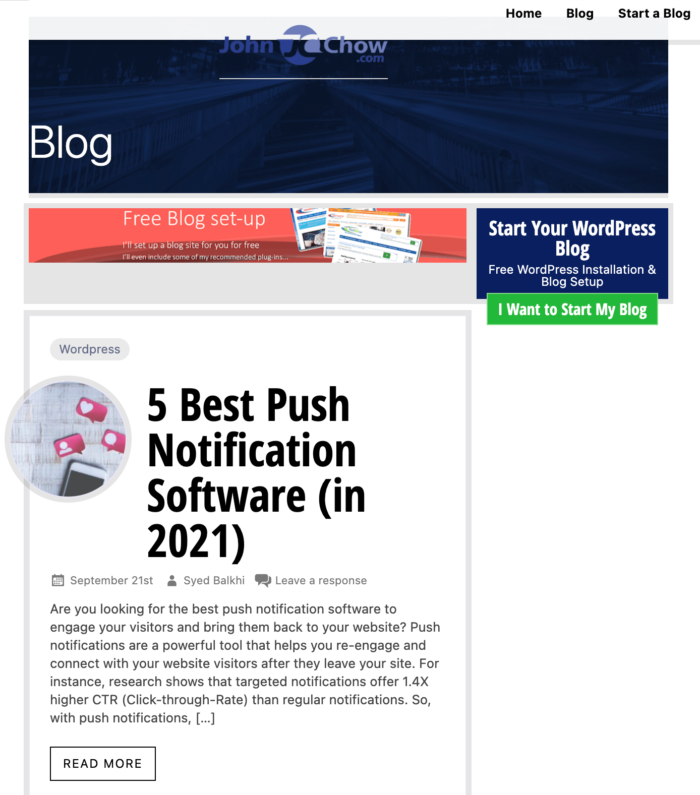
20. Jeff Bullas – Success Focus: Offer Additional Materials
Jeff Bullas doesn’t go overboard with his approach, but it’s effective.
Early in his blog posts, you see this box:

By offering free additional materials, you can draw in repeat blog visitors (returning to see what else you may offer, for example), and you can increase your conversions by showing off the kinds of marketing services you can provide.
FAQs About Marketing Blogs
The top marketing blogs have great content, a solid SEO foundation, are well-written and easy for novices to understand, and are helpful for other marketers as well as for businesses that want to do their own marketing and are learning how from the blog.
Marketing blogs that get huge amounts of traffic are Neil Patel, Search Engine Journal, Unbounce, and CopyBlogger.
Marketing blogs should cover topics like content marketing, email marketing, SEO, paid advertising, landing page creation, how to create quality content, how to manage marketing campaigns, social media marketing, emerging marketing apps and technologies, tools that can be used for marketers or businesses doing their own marketing, and other similar topics.
Yes, blogging is a form of digital marketing, particularly if you’re using your blog as a content marketing tool.
Lessons from 20 Marketing Blogs Conclusion
If you are a marketer with plans to create more content, now is the time to learn from the best.
These successful digital marketing blogs know how to wax poetic about a number of topics associated with content marketing, affiliate marketing, SEO, email marketing, marketing automation, and more. Many of the inbound marketing and other digital marketing tips presented in these top blogs should help you strengthen your marketing campaign and achieve success.
Did I miss any other top-notch digital marketing bloggers on this list?
Who is your favorite content marketing blogger/strategist? Let me know in the comments below.
from Neil Patel https://ift.tt/2tzUH2G